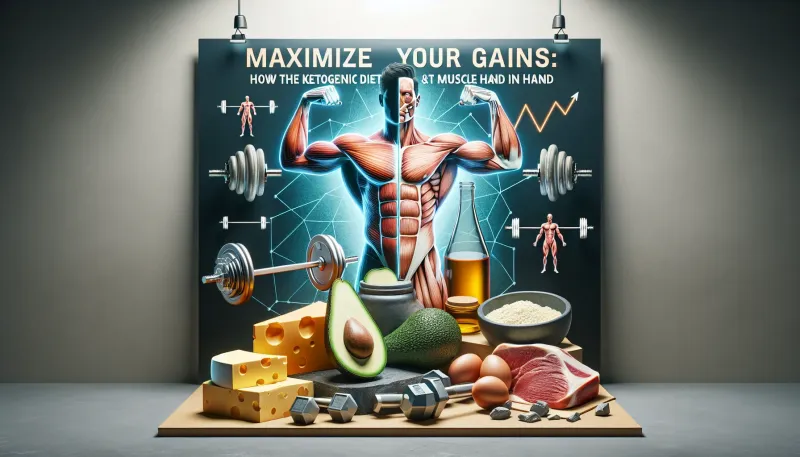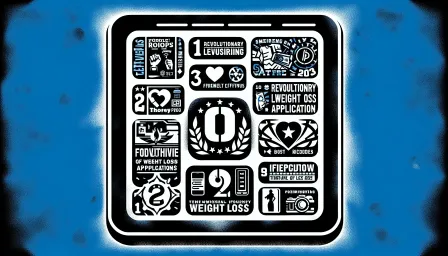Maximize Your Gains: How the Ketogenic Diet and Muscle Gain Go Hand in Hand

Discover how the ketogenic diet can effectively help you gain muscle mass. Learn how to balance your macros and optimize your workouts for maximum gains.
The ketogenic diet, often popularized for its rapid weight loss benefits, is also emerging as a powerful ally in muscle gain. While the traditional approach to building muscle involves a high-carb diet, the keto diet offers unique advantages that can help you achieve impressive results. This comprehensive guide will explain how the ketogenic diet supports muscle growth, debunk common myths, and provide practical tips for maximizing your gains.
Understanding the Ketogenic Diet
The ketogenic diet is a high-fat, moderate-protein, and very low-carbohydrate eating plan that forces the body to enter a metabolic state known as ketosis. In ketosis, the body becomes incredibly efficient at burning fat for energy, producing ketones in the liver to be used as an alternative fuel source. Common foods in a keto diet include meat, fish, eggs, dairy, oils, nuts, and low-carb vegetables.
Ketogenic Diet and Muscle Gain: Debunking the Myths
Myth 1: Carbs are Essential for Muscle Growth
While carbohydrates provide a quick source of energy for intense workouts, they are not essential for muscle growth. Protein, along with sufficient fats, can provide the necessary building blocks for muscle repair and growth. In fact, some studies suggest that low-carb diets can support muscle gain, provided that adequate protein intake is maintained.
Myth 2: Keto Leads to Muscle Loss
Another common misconception is that the ketogenic diet results in muscle loss. When appropriately managed, the keto diet can help preserve muscle mass. By ensuring a high intake of protein and engaging in resistance training, you can maintain and even increase muscle mass while in ketosis.
How the Ketogenic Diet Promotes Muscle Gain
Enhanced Fat Burning
One of the remarkable benefits of the ketogenic diet is enhanced fat burning. With the body relying on fat for energy, you can reduce body fat while preserving lean muscle mass. This leads to a more defined and muscular physique.
Stable Energy Levels
Unlike high-carb diets that can cause energy spikes and crashes, the ketogenic diet offers stable energy levels. This consistency can improve workout performance, enabling you to train harder and longer, thereby promoting muscle growth.
Improved Hormonal Balance
The ketogenic diet can positively influence hormonal balance, particularly insulin and growth hormone. Stable insulin levels can improve fat metabolism and reduce fat storage, while increased growth hormone can enhance muscle protein synthesis and recovery.
Anti-Inflammatory Benefits
Ketones have anti-inflammatory properties that can help reduce exercise-induced inflammation. This can lead to faster recovery times and more effective workouts, both of which are critical for muscle growth.
Practical Tips for Maximizing Muscle Gain on a Ketogenic Diet
Monitor Your Macronutrients
To succeed on a ketogenic diet, it's essential to carefully monitor your macronutrient intake. Aim for a daily intake of 70-75% fat, 20-25% protein, and 5-10% carbohydrates. Ensuring adequate protein intake is crucial, as it provides the amino acids needed for muscle repair and growth.
Stay Hydrated
Hydration is vital on the keto diet, as the body's fluid balance changes. Adequate hydration helps optimize muscle function and recovery, so aim to drink plenty of water throughout the day.
Incorporate Resistance Training
To maximize muscle gain, incorporating resistance training is non-negotiable. Focus on compound movements such as squats, deadlifts, and bench presses, which target multiple muscle groups and promote muscle growth. Aim for a combination of heavy weights with lower reps and lighter weights with higher reps for optimal results.
Utilize Targeted Ketogenic Diet (TKD) or Cyclical Ketogenic Diet (CKD)
If you're involved in high-intensity training, you might consider a Targeted Ketogenic Diet (TKD) or a Cyclical Ketogenic Diet (CKD). TKD involves consuming a small amount of fast-absorbing carbs around workouts to replenish glycogen stores, while CKD alternates between periods of strict keto and higher-carb refeeds to support intense training sessions.
Prioritize Sleep and Recovery
Muscle growth occurs during rest periods, so prioritizing sleep and recovery is essential. Aim for 7-9 hours of quality sleep per night and incorporate active recovery days into your routine to facilitate muscle repair and growth.
Sample Meal Plan for Muscle Gain on a Ketogenic Diet
To give you a practical idea of how to structure your meals, here's a sample one-day meal plan:
Breakfast
Ingredients: Scrambled eggs cooked in butter, avocado slices, spinach sautéed in olive oil.
Benefits: High in protein and healthy fats, this breakfast provides sustained energy and supports muscle recovery.
Lunch
Ingredients: Grilled chicken breast with mixed greens, cherry tomatoes, feta cheese, and a dressing made from olive oil and vinegar.
Benefits: A balanced meal rich in protein, vitamins, and minerals essential for muscle function and repair.
Dinner
Ingredients: Baked salmon with a side of roasted Brussels sprouts and cauliflower, topped with a dollop of garlic butter.
Benefits: Packed with omega-3 fatty acids and antioxidants, this dinner supports muscle health and reduces inflammation.
Snack
Ingredients: Greek yogurt mixed with a handful of nuts and seeds.
Benefits: A high-protein snack that provides essential amino acids for muscle repair and growth.
Supplements to Consider
While whole foods should be your primary nutrient source, certain supplements can enhance your ketogenic muscle gain journey:
Exogenous Ketones
Exogenous ketones can help you get into and maintain ketosis, especially during the initial adaptation phase.
Branched-Chain Amino Acids (BCAAs)
BCAAs can support muscle protein synthesis, reduce muscle soreness, and improve exercise performance.
Creatine
Creatine is a well-researched supplement that can improve strength, increase muscle mass, and enhance recovery.
Potential Challenges and Solutions
Adopting a ketogenic diet for muscle gain can come with its challenges. Here are some common issues and solutions:
Challenge: Keto Flu
The "keto flu" can occur as your body adjusts to burning fat for fuel. Symptoms include fatigue, headaches, and brain fog.
Solution:
Stay hydrated, consume enough electrolytes, and gradually reduce your carb intake to ease the transition.
Challenge: Difficulty Hitting Protein Targets
Consuming enough protein without exceeding carb limits can be challenging.
Solution:
Choose high-protein, low-carb foods like meats, fish, eggs, and protein-rich dairy products. Consider protein supplements if necessary.
Challenge: Reduced Exercise Performance
You might experience a temporary dip in exercise performance as your body adapts to using ketones for fuel.
Solution:
Allow your body time to adjust, focus on consistent training, and consider targeted carbs around workouts if needed.
Conclusion
The ketogenic diet, when properly managed, can be an effective strategy for muscle gain. By understanding the unique metabolic state of ketosis, debunking myths, and adopting practical tips, you can optimize your diet for maximum muscle growth. Stay hydrated, focus on high-quality protein sources, engage in resistance training, and consider supplements to support your journey. With dedication and the right approach, the ketogenic diet can help you achieve impressive muscle gains while maintaining a lean physique.



























